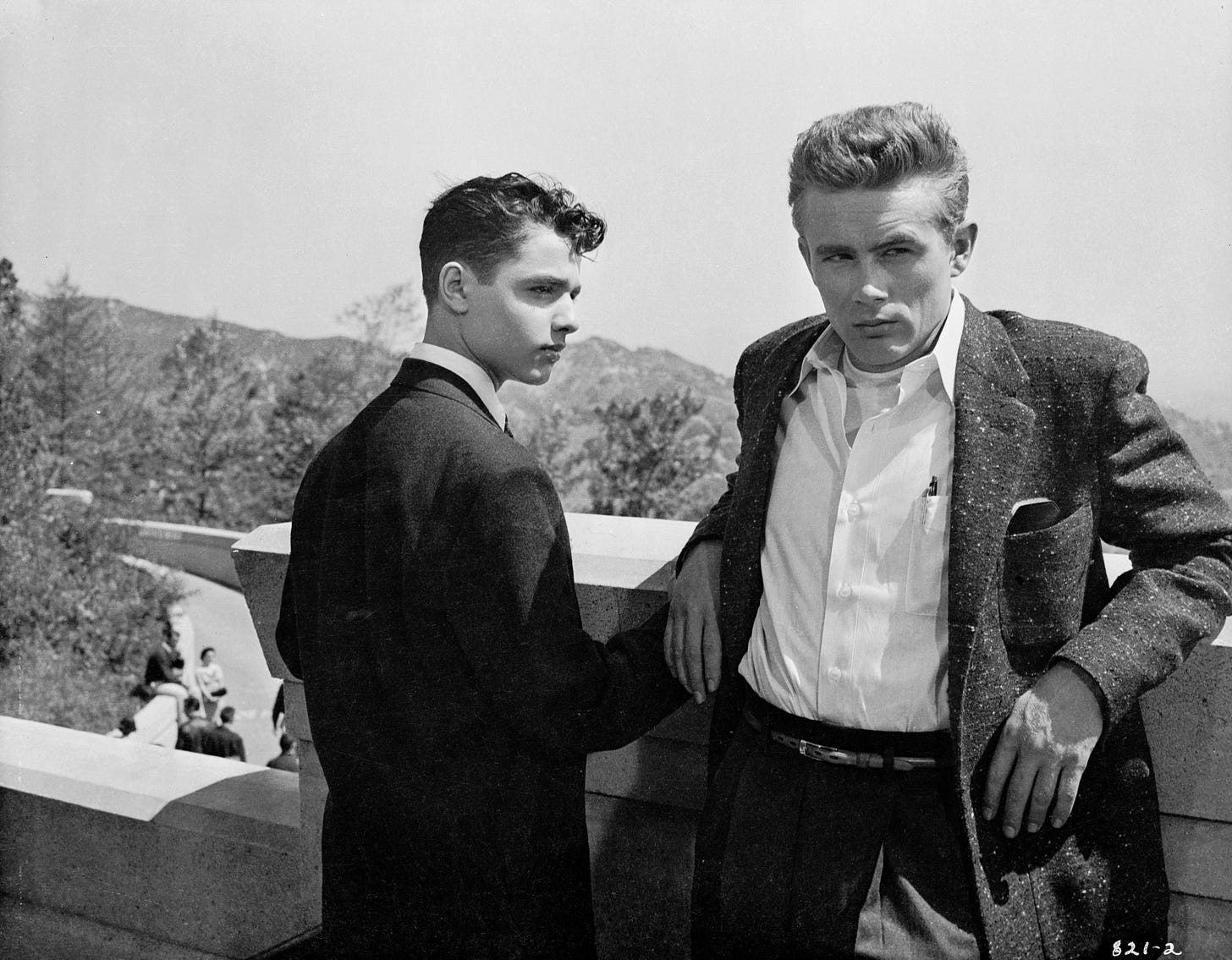“... And a Classmate”
Berlin's annual film festival celebrates "Rebel without a Cause," with one notable and inexplicable exception.
Rebel without a Cause (1955) will play at 73rd annual Berlin International Film Festival, better known as the Berlinale, this week as part of the festival’s cinema retrospective. But what got me was the official program description of the film, which seems to come straight out of 1955, in that it is advertising something different than what is actually on screen.
Jim Stark is 17 and on bad terms with his parents. Having recently moved to Los Angeles, he soon becomes known to the police. In order to be accepted as a new student in high school and because he wants to impress the girl next door, Judy, he takes part in a dare that ends fatally for his challenger. When his [i.e. the challenger’s] clique wants revenge, Jim flees with Judy and a classmate... The film, which premiered a month after James Dean’s accidental death, made the then-24-year-old actor “immortal.” Rebel Without a Cause created an idol for young people that is still potent today. In addition, it formed the blueprint for “teenage films” worldwide, which defined cinema as part of an international youth culture. The style was shaped by the fact that youthful self-discovery takes place in a group of peers and in the deliberate confrontation with parents and representatives of state authority such as teachers and police officers. Conceived as a commentary on the generation gap and a “juvenile delinquency problem” in the USA, the film invited the world’s youth to identify with a rebellious outsider. (my trans.)
While problems with parents are obviously a big part of the movie, there is no deliberate confrontation with police (who, in the movie, intrude unprovoked), and to the best of my recollection, no teacher even appears in the film. Leave it to the Germans to see a metaphor for statism that isn’t there!
But, more seriously, the first half of the description is quite problematic in the way the Berlinale erases the character of Plato, reducing him to “a classmate.” Given that Plato’s actions, arguably, drive the mechanics of the plot and constitute the focus of the final half-hour and the movie’s climax, it’s bizarre to see the entirety washed away. In the Berlinale’s mind, the story is that Jim met Judy, Jim fought for and won Judy’s hand, and then some other stuff we won’t speak about happened, and Jim and Judy lived happily ever after.
What that unspeakable material is shouldn’t be worth hiding anymore. Indeed, it never really was. In an interview way back on August 8, 1959 (!), Rebel screenwriter Steward Stern openly discussed the “homosexual overtones” he wanted in the story, and everyone from Nicholas Ray, who directed the film, to Sal Mineo, who played Plato, was quite frank about the movie examining, as much as the 1950s allowed, homoerotic feelings among teenage boys.
As I have pointed out previously, Warner Bros. was not particularly thrilled with this storyline and actively promoted a false plot summary, which recast the movie as a story of Jim Stark trying to join a crime gang before hooking up with Judy: “Jim (JAMES DEAN), an unruly youth questioned by the police, … tries to join a gang led by Buzz.” Early critics dutifully followed WB’s recommendation to emphasize the Jim-Judy romance and ignore the final act of the film. Thus, Variety’s Robert Landry minimized the character of Plato and wrote that the film revolved around Judy’s “bosoms, lipstick and sex feelings.” The Hollywood Reporter’s Jack Moffitt ignored Plato entirely and wrote that the entire movie was a Romeo-and-Juliet story surrounding the disapproval Jim’s and Judy’s parents had for the lovers—a storyline that does not exist in the movie. Bosley Crowther of the New York Times similarly refused to treat Plato as an actual character in a film he allusively called “desperate and dangerous” and thus praised a two-second shot of Jim’s parents smiling at Judy as the actual climax of the movie. Given that the parents’ flabbergasted reaction can plausibly be read as “Wait, he’s with a girl?”, this is not the full-throated endorsement critics thought it was.
Anyhow, although queer critics long understood what they were seeing, it took mainstream critics until the twenty-first century to discuss homoerotic elements in Rebel without a Cause in publications for straight audiences. It surprises me to see the Berlinale returning to those weird, distorted twentieth century fictions, and the groundbreaking character of Plato, the first sympathetic portrayal of a gay youth in film, reduced simply to “a classmate.”





